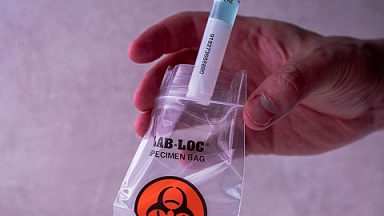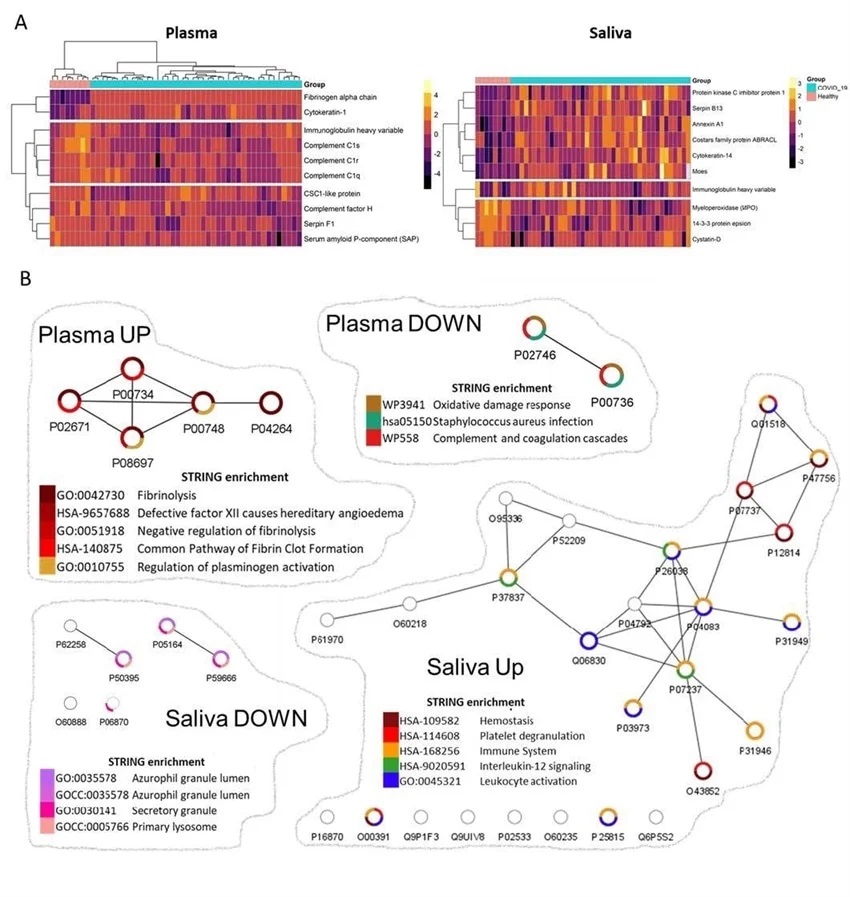U.S. Study Shows That Majority Of Post-COVID-19 Individuals Have Immune And Clotting Dysfunction Which Can Be Detected Via Plasma And Saliva
Source: Medical News - Long COVID Mar 23, 2022 3 years, 11 months, 3 days, 10 hours, 40 minutes ago
A new study by researchers from J. Craig Venter Institute-California, Agilent, Technologies, Inc-California, University of Delaware, Maine Medical Center and University of California-San Diego have found that majority of POSt-COVID-19 individuals have immune and clotting dysfunction which ca be detected via plasma and saliva samples.

To date, it is apparent that individuals who ‘recover’ from SARS-CoV-2 infections are most likely to develop long COVID (post-acute sequala of SARS-CoV-2 infection or PACS).
Although antibody response kinetics against viral particles is well studied in natural infection and vaccine, the molecular mechanisms governing disease formation remain elusive.
The study team investigated plasma and saliva samples from COVID-19 and healthy control subjects to understand early immune responses globally after exposure to the virus.
Detailed antibody analyses showed robust IgA and IgG responses, neutralizing functions to the SARS-CoV-2, and positive correlations between matched plasma and saliva fluids.
Importantly, shotgun proteomics revealed persistent inflammatory patterns in convalescent samples including dysfunction of neutrophil-fibrinogen axis, and dysregulated immune and clotting functions.
The study findings suggest saliva can also be used to monitor serology and immune functions to detect early and chronic signs of disease development.
Further delineation of the pathophysiology in saliva may lead to discovery of novel biomarkers and therapeutic targets to patients at risk to develop PASC and chronic conditions.
The study findings were published on a preprint server and are currently being peer reviewed.
https://www.biorxiv.org/content/10.1101/2022.03.18.484814v1
.jpg) Study Design
Study Design
Many researchers have extensively investigated blood profiles and lungs of COVID-19 patients to understand the acute phase immunopathogenesis. These studies also helped researchers to identify diagnostic and protective markers.
It is already known that two components of the blood, i.e., antibodies and T cells, play a critical role in the clearance of SARS-CoV-2 viruses and also protect from severe COVID-19.
Numerous studies have reported long-term complications of the COVID-19 infection, which is known as Long COVID or post-acute sequelae of COVID-19 (PASC). These studies revealed that the immunopathogenesis of COVID-19 sustained beyond the recovery of pulmonary disease. In addition, uncharacteristic innate immune signaling cascades and inflammation were reported in COVID-19 convalescent patients.
Hence more detailed studies are required to understand the pathophysiology associated with the initiation of aberrant innate immune activation at mucosal surfaces, which are in direct contact with the viral particles.
Since transmission of SARS-CoV-2 primarily occurs through saliva, i
.e., droplets generated by an infected individual while talking or coughing, saliva is regarded as the optimal target to monitor alterations of the mucosal immune system by respiratory infection.
Furthermore, several studies have reported the association between the oral/gastrointestinal mucosal alterations and the pathophysiology of PASC, highlighting the importance of saliva to identify the molecular mechanisms and early indicators of SARS-CoV-2.
https://academic.oup.com/ecco-jcc/article/16/Supplement_1/i068/6512455?login=true
https://pubmed.ncbi.nlm.nih.gov/34248921/
https://pubmed.ncbi.nlm.nih.gov/35082169/
The study focused on the chronic inflammatory response during the early convalescent phase, i.e., two weeks post clinical symptoms of SARS-CoV-2.
The blood and saliva samples in this study were obtained from COVID-19 donors who visited the COVID clinic at the University of California, San Diego.
The study team investigated the association between biological and demographic factors. They evaluated the plasma antibody levels of the study cohort, which is considered to be the gold standard to analyze immune responses to viral infection.
The study team further examined the mucosal antibody response and proteomic alterations at systemic and mucosal levels.
The study findings revealed the presence of strong inflammatory responses to the SARS-CoV-2 in convalescent plasma and saliva, even in the absence of clinical manifestation of PASC.
The study team detected aberrant immune responses and blood clotting dysfunctions in the study samples. The researchers observed that the biofluids contained antibodies against the SARS-CoV-2 receptor-binding domain (RBD), spike protein (S1 and S2), and the nucleoprotein (NP).
The study findings showed the presence of RBD binding IgA in both saliva and plasma, RBD binding IgM in saliva, and S1 binding IgG in plasma. This result implies that saliva could be used to detect the presence of specific SARS-CoV-2 antibodies and immune responses.
The saliva samples also exhibited unique patterns associated with antibody and proteomic profiles that were different from plasma.
The study team also demonstrated that IgA response in COVID-19 convalescent individuals was significantly higher in saliva than plasma. However, IgG response followed an opposite trend. Importantly, the plasma samples provided information about the dysregulated blood clotting functions, while saliva samples conveyed greater information regarding immunopathogenesis, including information concerning dysregulated fibrin clot and dysregulated neutrophil pathways.
 Network analyses depicted biological functions altered in convalescent plasma and saliva.
Network analyses depicted biological functions altered in convalescent plasma and saliva.
The study team assessed the biofluid samples via shot-gun proteomics to understand immunoglobulin patterns found during COVID-19, which affects the composition and function of the entire repertoire of human proteins.
The researchers stated that investigation of molecular patterns would help identify early signals associated with disease manifestations.
Interestingly, the plasma proteomics of COVID-19 samples demonstrated dysregulated blood clot process, and salivary proteomics revealed responses linked to the innate immune compartments.
Detailed saliva analysis of recovered COVID-19 individuals revealed that an increase in numerous proteins, such as antileukoproteinase and Matrix metalloproteinase-9, that affects neutrophil functions or migration.
It also showed significant enhancement in transmembrane protease serine, responsible for activating the SARS-CoV-2 spike protein to enable the viral-cell fusion process.
Detailed proteomic analyses also exhibited significant correlations between salivary fibrinogen and salivary annexin-1.
The study team also detected a strong IgA response in saliva to the SARS-CoV-2 infection, with a limited range of neutralizing activity. Interestingly, salivary IgAs secreted in polymeric form (dimeric and tetrameric) confer greater neutralizing activity compared to IgGs.
Corresponding author, Dr Marcelo Freire, D.D.S., Ph.D., D.Med.Sc. an Associate Professor of Genomic Medicine and Infectious Diseases at the J. Craig Venter Institute told Thailand
Medical News, “Overall, early dysfunctional immune responses and blood clotting pathway dyscrasias are detected in saliva and plasma of COVID-19 cases. Saliva is an important vehicle for the spread of the SARS-CoV-2 viruses and a fluid for detection of not just antibody responses, but also diverse immune pathways, including mucosal immunity, innate immune responses, neutrophil functions, and others. Comparative analysis of the antibody and proteomic profile suggests the distinct signatures in local oral mucosa when compared to systemic immune responses.”
He added, “Convalescent plasma samples exhibited IgG-centered antibody profiles with high neutralizing potency plus dysregulation in blood clotting factors in comparison to healthy samples. Saliva showed higher concentration of IgA response with lower neutralizing activity, but with activation of novel immune markers related to disease development. Here, we highlight that our participants did not completely resolve from the SARS-CoV-2 infections, which in turn led to chronic inflammation and blood clotting dysfunctions, without clear clinical manifestations during the convalescent phase. The potential of saliva to dissect immunopathogenesis in the context of population analysis can offer better understanding of the mucosal and innate immune response kinetics and specificity to exposure to SARS-CoV-2 and various infectious agents.”
The study team noted that one of the limitations of this research was its study cohort, which contained only SARS-CoV-2 infected individuals and no healthy donors. Also, the control samples came from the pre-COVID era, with matched demographics. Another limitation was that samples were collected at only a one-time point and the proteomic responses and antibody levels were not adjusted as per the baseline of each individual.
However, the findings importantly revealed that saliva could serve as a potential immune biofluid. As saliva samples are easy to collect, they can be used for early detection and prevention of virus-induced chronic inflammatory sequelae. In the future, COVID-19 vaccines must be designed such that they can also activate a robust mucosal antiviral response, which could protect individuals against the disease.
For the latest on
Long COVID Research, keep on logging to Thailand Medical News.

.jpg)
 Network analyses depicted biological functions altered in convalescent plasma and saliva.
Network analyses depicted biological functions altered in convalescent plasma and saliva.